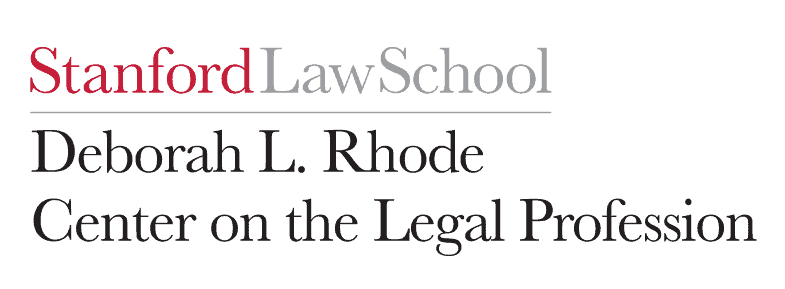by Graham Ambrose, Rhode Center Civil Justice Fellow

STANFORD, CALIF. — Leading scholars, practitioners, and judges met on February 11 and 12, 2023, at Stanford Law School as part of Stanford Law Review’s symposium on access to justice. One panel explored the fledgling movement to make legal help less expensive by rewriting the rules governing the practice of law.
The panel, which was moderated by Stanford Law Professor David Freeman Engstrom, featured Salena Copeland of the Legal Aid Association of California, Karin Martin of the University of Washington, Dan Rodriguez of Northwestern Law School, Lauren Sudeall of Georgia State Law, and Vice Chief Justice Ann Timmer of the Arizona Supreme Court.
Arizona has emerged as a national leader of this front. At the event, Vice Chief Justice Ann Timmer surveyed some of her state’s recent reforms. One of the most significant was the elimination of ethics rule 5.4, which barred non-lawyers from owning law firms.
A recent report from Stanford’s Rhode Center on the Legal Profession found that non-lawyer ownership has spurred innovation in Arizona and, at least so far, generated relatively few complaints from consumers.
Stanford Law Professor David Freeman Engstrom, an author of that report and co-director of the Rhode Center on the Legal Profession, challenged reformers to consider the extent to which lawyers should play a role in the legal system of the future. Because of their skills, education, and ethics requirements, Freeman Engstrom suggested, lawyers should be centered but equipped with technology and perhaps even non-lawyer advocates.
As Vice Chief Justice Timmer noted, and as the Rhode Center report describes in detail, Arizona has answered this challenge with legal paraprofessionals. Launched in 2021, the paraprofessionals program licenses legal versions of nurse practitioners to practice law in select contexts, including family law and criminal cases, without the threat of jail time.
Many of the newly licensed paraprofessionals in family law were formerly family law paralegals, Timmer said, and they “know that subject backwards and forwards.”
“I’ve heard anecdotally from judges that they already tried cases, and [the paraprofessionals] have been better than most attorneys they have in their court,” the vice chief justice added.
Opposition to regulatory reform remains ardent in several states, including California. (When discussing Arizona’s leadership on eliminating ethics rule 5.4, Timmer received a round of applause.) In 2020, the State Bar of California launched a working group to study possible changes to the rules that govern the practice of law. The group was convened to respond to the state’s worsening access-to-justice crisis. Last year, however, the legislature shut down the group, effectively ending the possibility of legal reforms in the short-term.
Salena Copeland, executive director of the Legal Aid Association of California, suggested that the legal regulatory reform movement learn to frame its case in terms legislators understand: dollars and cents. Because state courts need public funds to function, changes to the operation of courts must be accountable to the fiscal math that governs the rest of politics. For instance, civil assessments in California have been criticized recently for their unfairness. But courts and other state institutions rely on these fees, which generate $100 million annually.
One recent example of successful advocacy involves the effects of a driver’s license suspension. California passed a law in 2017 prohibiting the DMV from suspending driver’s license for failure to pay fines, and recently shielded some low-income people from having their license suspended for failure to pay child support.
“The reason we’ve been successful in California is because we connect it to money,” Copeland said. “Legislators will ask, ‘How much will this cost us’? And if you can’t answer that question, they’re not going to do the amazing policy work you’re arguing for.”
However, a major obstacle to reforms remains the paucity of data from state courts. Various panelists decried the “black box” of information about how courts operate, an information gap that hampers solutions.
Karin Martin, professor at the University of Washington, discussed the data shortage in the context of monetary sanctions, or the fines, fees, restitution, and other financial penalties created by the criminal legal system. Monetary sanctions include, for instance, the probation fees imposed by a local probation department either before trial or after conviction. Such fees create significant stress and financial hardship, forcing individuals with little money into hard choices like paying their rent or paying court fees.
Monetary sanctions hinder access to justice by “ensnaring people in the criminal legal system that then thwarts their ability to engage in the civil legal system,” Martin said.
But reform is tricky in part because no one knows the exact size of the problem. Only 25 states collect data on the size of criminal legal debt. “Literally half the states cannot tell you how much has been assessed in fines, fees, restitution,” Martin said. “They cannot tell you how much has been collected. They cannot tell you how many people have been incarcerated” due to these fines.
Part of the problem is that courts rely on outdated technology. But part of the problem is legal complexity. Panelists blamed overly complex court processes and systems, which frustrate litigants and multiply the difficulty of administering accessible courts.
“Law is really, really complicated—and ever more so,” noted Dan Rodriguez, a professor and former dean at Northwestern University Pritzker School of Law.
Rodriguez challenged lawyers to question the purpose and practice of legal self-regulation—whereinstate supreme courts assume, “as a matter of natural law,” the ability to control the practice of law. One consequence of this “zombie legal doctrine,” quipped Rodriguez, is that “the content of justice is determined by where you live, and that’s beyond sad.”
Ultimately, it is the public that loses most from the perception—and reality—that America’s institutions of justice fail to achieve justice. To most Americans, “courts are where bad things happen to people,” explained Copeland. “Courts are where your uncle goes to prison, where families are separated from their children, where you can lose your driver’s license in many states still, where even if you don’t go to prison, you pay fines and fees you can’t afford.”
Lauren Sudeall, a professor at Georgia State University College of Law, proposed “shrinking the system” of civil justice in a process she calls “delegalization.” In parallel to the process of “decriminalization” in the criminal justice context, delegalization would remove certain wrongdoing from the civil legal system entirely. For example, under this approach, a tenant’s inability to pay rent might be handled not through courts at all, but through social services or community-based programs.
Such a project—which, Sudeall recognized, is rife with problems and pitfalls—would require new ways of thinking about legal issues. It would also demand new humility from lawyers, who consider themselves to be problem-solvers.
“As it functions, the system is not achieving its own goals,” Sudeall said. “The legal system might not be the right place for some of these issues. Courts might not be the institution best positioned to resolve some of these questions.”
